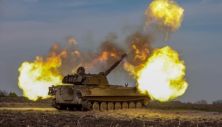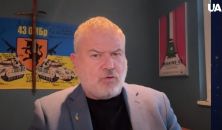In this interview with Mr. Glenn Grant, UATV wonders why and who let the authoritarian dictators of the world unite and project global instability.
See the full interview to learn more details from the British officer and former adviser to the Ukrainian Ministry of Defense.
— My first question is about the modern axis. It is growing stronger, and Ukraine is now at war with two nuclear powers—not only Russia but also North Korea. Do you think this became possible because the democratic alliances were too weak, or is it a natural process when dictators want to expand their influence over other countries?
— A good question. I think it’s a bit of both. I don’t think anybody would have attacked Ukraine if the Western alliance had been strong and clearly intent on defending Ukraine properly from the beginning. There’s no question that in 2014, had America and Great Britain, for example, put a battalion of troops somewhere in Ukraine and relatively close to the front line in barracks, this second large war likely wouldn’t have happened. Putin wouldn’t have risked a strong NATO response.
But right now, we have weak politicians.
NATO itself isn’t weak—it may not be as strong as people would like, but it’s far from weak. However, some politicians, like [German Chancellor Olaf] Scholz, are sending the wrong messages, which make leaders like the North Korean leader think they have opportunities because they perceive America as weak at the moment.
— And what about Ukraine? Is it at all possible to hold back Russia, Iran, and North Korea on Ukrainian territory with the means that our Western allies are currently providing?
— I think you need to look at this in two ways. Firstly, people often talk about the means they receive from allies without discussing what can be done within Ukraine. I’ve mentioned this many times before: there are substantial actions that can be taken within Ukraine to strengthen it.
This includes allowing the army to fight more effectively, providing better leadership by placing capable people in charge, implementing improved processes, and creating better logistical systems. When all of these aspects are working efficiently, you could manage with fewer foreign resources.
This, however, requires a significant amount of work. If people are going to accomplish this, it’s crucial to realize that we can’t just keep receiving foreign resources and losing them because we’re scattered on the battlefield or lacking coordinated efforts, like with drones.
Today, there’s even a meeting discussing the export of spare equipment, which is unbelievable—there shouldn’t be any spare equipment in Ukraine. Every single drone, vehicle, and weapon should be on the front line. This indicates that there’s something fundamentally wrong with the procurement process and the overall strategy, from the front line through to the Ministry of Defense.
— And do you think part of this could be because our Western allies are looking for some return on their investment as they help secure Ukraine?
— No, I don’t think that’s the case at all. I was in London two weeks ago, met with several people, and heard nothing of the sort. My American friends don’t talk that way either. Most people understand that this is a war against the West. The lack of some equipment is often because it simply doesn’t exist, or it would require too much to bring it up to a usable standard.
For example, there’s an ammunition shortage in the West right now—it can’t match the massive stockpiles North Korea has amassed over decades. So, no, I don’t see this cynical view of the West using Ukraine.
People want Ukraine to win and want to provide their best to Ukraine, especially the Western allies who support Ukraine fully. Nationally, across the public in most of these countries, support for Ukraine is rock solid.
— One of the most critical parts of future Ukrainian security lies in security guarantees. Recently, Scholz declared that no warring country can join NATO, which implies Ukraine could be denied membership while any occupied territories remain. Is it possible—and perhaps more effective—to consider a regional alliance, for example, along the Baltic and Black Sea?
— There is definitely a need right now for a coalition of the willing to support Ukraine, independent of Schultz or Hungary or other countries you might say are influenced by Russia. I do think that. And Schultz’s stance is somewhat hypocritical because, remember, Germany itself was divided during the Cold War, which was a form of war as well. Yet West Germany was allowed into NATO. NATO membership is political, and with a different president or chancellor, there could be a very different answer to your question. It might actually be beneficial for [Ukrainian President Volodymyr] Zelensky to stop talking about NATO for now, as more words or pleas won’t have any effect. Trust is the key factor. If Ukraine isn’t trusted, NATO membership is out of reach. If Ukraine is seen as a trusted Western ally, then it’s a possibility.
— That’s an interesting point. We have politicians like Viktor Orban and Robert Fico, who have clear pro-Russian positions but whose countries are in NATO. Do you think NATO is uncertain whether Ukraine could switch sides, or what’s your take on this?
— I don’t think it’s about switching sides. It’s about openness and how people engage with Western allies. I often say that trust means sitting on the same side of the table. When you start seeing leaders sitting on the same side, that’s when you know trust is building. But trust isn’t just about the leader; it’s also about the military, its leadership, and the entire military organization being aligned with NATO’s values.
Right now, unfortunately, the Ukrainian Defense Forces don’t fully embody NATO values, and that’s significant.
— And what are these NATO values? I often speak with NATO soldiers from countries like Estonia and Latvia, and they don’t always come across as very pro-European. Ukrainians, meanwhile, are saying they’re fighting to join the European family. So what NATO values do you mean, and are they lacking in Ukraine?
— I’ve written about this and presented it to the General Staff. The first value is honesty—straightforward honesty, which means telling people the truth. That isn’t always happening, from the front line to the backline. Without honesty, there can be no trust, and trust is essential for NATO.
The second value is the care of families, veterans, and those injured or affected, with the same level of dedication you’d give to your own children. Right now, there are Ukrainian families with soldiers missing, and when they inquire, they’re often told not to disturb the system. It’s a cold approach, with little regard for the families.
However, some units, like the 3rd Brigade, stand out for genuinely caring for everyone, and they should be the model. An army like that would defeat Russia in days.
But that foundation of honesty is crucial. Without trust in those above you, NATO senses that disconnect, and it’s something they feel keenly.
Read also: Ukraine Lacks Time to Recreate Nukes: Nuclear Expert










